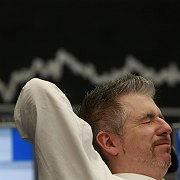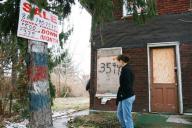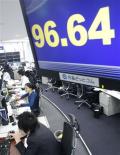THE SUBPRIME mortgage crisis that pushed homeowners into foreclosure and forced the Federal Reserve to bail out investment banker Bear Stearns has also sent state and local governments across the country scrambling to refinance municipal bonds before they are hit with exorbitant interest rates.At the center of the storm are long-term variable-interest bonds known as “auction-rate securities.” Unlike traditional fixed-rate bonds, the interest rates on these securities are reset every 7, 28 or 35 days through an auction process.
Historically, the rate paid has been less than on traditional bonds, making the national $160-billion auction-rate market a reliable source of cheap financing.
But that market has collapsed in the past two months, sending interest rates climbing. As a result, California, Richmond, the Bay Area Toll Authority, the East Bay Municipal Utility District and Sacramento County are among countless government agencies forced to restructure their bond debts.
 A trader reacts in front of the DAX board at the Frankfurt stock exchange.
A trader reacts in front of the DAX board at the Frankfurt stock exchange.









